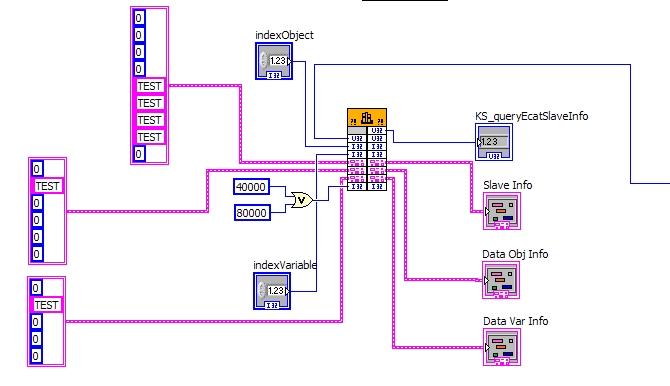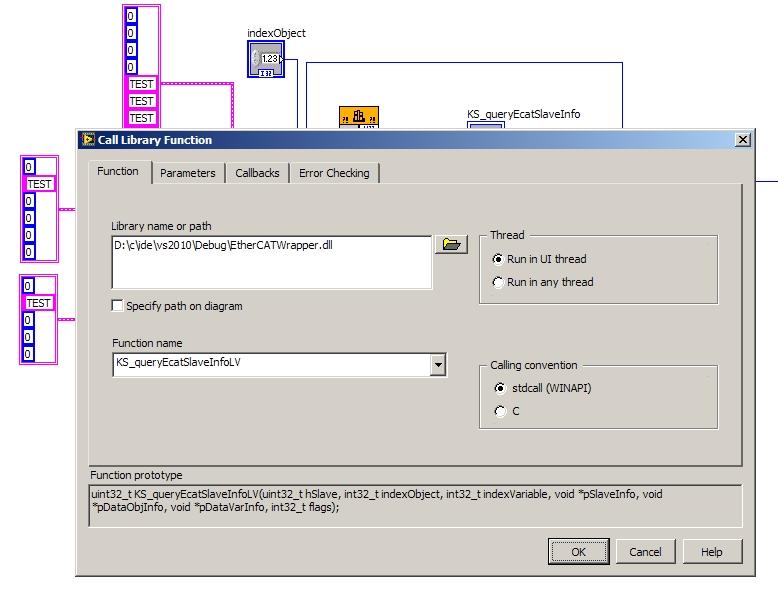
Reyneke
Members-
Posts
7 -
Joined
-
Last visited
Content Type
Profiles
Forums
Downloads
Gallery
Everything posted by Reyneke
-
Ooookay, I added more changes. Now the DLL looks like this: #ifndef ___ETHERCATLV_H#define ___ETHERCATLV_H/* Call Library source file */#include "extcode.h"/* lv_prolog.h and lv_epilog.h set up the correct alignment for LabVIEW data. */#include "lv_prolog.h"#include <api\_ethercat.h>#include <string.h>/* Typedefs */#if MSWin && ProcessorType != kX64 #pragma pack(push,1) #endif typedef struct { int32_t vendorId; int32_t productId; int32_t revision; int32_t serial; LStrHandle group; LStrHandle image; LStrHandle order; LStrHandle name; int32_t objCount; } TD1;typedef struct { int32_t objType; LStrHandle name; int32_t bitLength; int32_t index; int32_t syncIndex; int32_t varCount; } TD2;typedef struct { int32_t objType; LStrHandle name; int32_t dataType; int32_t bitLength; int32_t subIndex; } TD3; #if MSWin && ProcessorType != kX64 #pragma pack(pop) #endif #include "lv_epilog.h"extern "C" {_declspec(dllexport) uint32_t KS_queryEcatSlaveInfoLV(uint32_t hSlave, int32_t indexObject, int32_t indexVariable, TD1 *pSlaveInfo, TD2 *pDataObjInfo, TD3 *pDataVarInfo, int32_t flags);}_declspec(dllexport) uint32_t KS_queryEcatSlaveInfoLV(uint32_t hSlave, int32_t indexObject, int32_t indexVariable, TD1 *pSlaveInfo, TD2 *pDataObjInfo, TD3 *pDataVarInfo, int32_t flags){ KSEcatSlaveInfo* slaveInfo_; Error error = KS_OK; uint size = 0; MgErr err; const char* temp = "-none specified-\0"; error = KS_queryEcatSlaveInfo((KSHandle) hSlave, &slaveInfo_, flags); if (error == KS_OK) { pSlaveInfo->vendorId = slaveInfo_->vendorId; pSlaveInfo->productId = slaveInfo_->productId; pSlaveInfo->revision = slaveInfo_->revision; pSlaveInfo->serial = slaveInfo_->serial; if (indexObject > slaveInfo_->objCount) indexObject = 0; if (indexVariable > slaveInfo_->objs[indexObject]->varCount) indexVariable = 0; if (strlen(slaveInfo_->group) <= 0) { memcpy((char *) slaveInfo_->group, temp, strlen(temp) + 1); //slaveInfo_->group = temp; } size = strlen(slaveInfo_->group) + 1; err = NumericArrayResize(uB, 1, (UHandle *)&pSlaveInfo->group, size); if (!err) { memcpy(LStrBuf(*pSlaveInfo->group), slaveInfo_->group, size); LStrLen(*pSlaveInfo->group) = size; } if (strlen(slaveInfo_->image) <= 0) { memcpy((char *) slaveInfo_->image, temp, strlen(temp) + 1); //slaveInfo_->image = temp; } size = strlen(slaveInfo_->image) + 1; err = NumericArrayResize(uB, 1, (UHandle *)&pSlaveInfo->image, size); if (!err) { memcpy(LStrBuf(*pSlaveInfo->image), slaveInfo_->image, size + 1); LStrLen(*pSlaveInfo->image) = size; } if (strlen(slaveInfo_->order) <= 0) { memcpy((char *) slaveInfo_->order, temp, strlen(temp) + 1); //slaveInfo_->order = temp; } size = strlen(slaveInfo_->order + 1); err = NumericArrayResize(uB, 1, (UHandle *)&pSlaveInfo->order, size); if (!err) { memcpy(LStrBuf(*pSlaveInfo->order), slaveInfo_->order, size); LStrLen(*pSlaveInfo->order) = size; } if (strlen(slaveInfo_->name) <= 0) { memcpy((char *) slaveInfo_->name, temp, strlen(temp) + 1); //slaveInfo_->name = temp; } size = strlen(slaveInfo_->name) + 1; err = NumericArrayResize(uB, 1, (UHandle *)&pSlaveInfo->name, size); if (!err) { memcpy(LStrBuf(*pSlaveInfo->name), slaveInfo_->name, size); LStrLen(*pSlaveInfo->name) = size; } pSlaveInfo->objCount = slaveInfo_->objCount; pDataObjInfo->objType = slaveInfo_->objs[indexObject]->objType; if (strlen(slaveInfo_->objs[indexObject]->name) <= 0) memcpy((char *)slaveInfo_->objs[indexObject]->name, temp, strlen(temp) + 1); size = strlen(slaveInfo_->objs[indexObject]->name) + 1; err = NumericArrayResize(uB, 1, (UHandle *)&pDataObjInfo->name, size); if (!err) { memcpy(LStrBuf(*pDataObjInfo->name), slaveInfo_->objs[indexObject]->name, size); LStrLen(*pDataObjInfo->name) = size; } pDataObjInfo->bitLength = slaveInfo_->objs[indexObject]->bitLength; pDataObjInfo->index = slaveInfo_->objs[indexObject]->index; pDataObjInfo->syncIndex = slaveInfo_->objs[indexObject]->syncIndex; pDataObjInfo->varCount = slaveInfo_->objs[indexObject]->varCount; pDataVarInfo->objType = slaveInfo_->objs[indexObject]->vars[indexVariable]->objType; if (strlen(slaveInfo_->objs[indexObject]->vars[indexVariable]->name) <= 0) memcpy((char *)slaveInfo_->objs[indexObject]->vars[indexVariable]->name, temp, strlen(temp) + 1); size = strlen(slaveInfo_->objs[indexObject]->vars[indexVariable]->name) + 1; err = NumericArrayResize(uB, 1, (UHandle *)&pDataVarInfo->name, size); if (!err) { memcpy(LStrBuf(*pDataVarInfo->name), slaveInfo_->objs[indexObject]->vars[indexVariable]->name, size); LStrLen(*pDataVarInfo->name) = size; } pDataVarInfo->dataType = slaveInfo_->objs[indexObject]->vars[indexVariable]->dataType; pDataVarInfo->bitLength = slaveInfo_->objs[indexObject]->vars[indexVariable]->bitLength; pDataVarInfo->subIndex = slaveInfo_->objs[indexObject]->vars[indexVariable]->subIndex; } return error;}#endif // ___ETHERCATLV_H It works fine, all variables are within specific parameters, it even checks if variables have been assigned or not and yet, still, I get an 1097 memory error everytime the program runs. I think it might be another memory problem, as sometimes the "-none specified-\0" message lacks one or two characters and yet I can"t really explain why.
-
Good point. That might be, but unluckly KSEcatSlaveInfo*is initialized by the driver, so its out of my hand to do that. About the parameters: It took me a few tries to realize, that the driver does not return a NULL if a string is missing and not a "\0" either. In fact it returns something erroneus, that looks like a string to me without an '0'. I managed to catch that by counting the length of the string and replacing it with an informational message (called this, because PDOs and SDOs can not include a value bz design, so that it is not an error) if the length is zero. However that brought up two interesting new things: There is something added to it, which seems completely random. At the moment catching the exception looks like this: if (strlen(slaveInfo_->group) <= 0) memcpy((char *) slaveInfo_->group, temp, strlen(temp)); size = strlen(slaveInfo_->group); err = NumericArrayResize(uB, 1, (UHandle *)&pSlaveInfo->group, size); if (!err) { memcpy(LStrBuf(*pSlaveInfo->group), slaveInfo_->group, size); LStrLen(*pSlaveInfo->group) = size; } [\code] while temp is: const char * temp = "nothing specified \0"; Still that error remains ... Do I need to check the int values also/ And if yes, how? I mean null in int just means zero.
-
Well, slaveInfo_ is self initialising. In fact if you call it via malloc or something else, chances are it is going to fail and cause an exception. Ahhh, I see. Now it all makes a lot more sense. Thank you for clearing that error up, Rolf. I changed the code accordingly and now it looks like this: #ifndef ___ETHERCATLV_H#define ___ETHERCATLV_H/* Call Library source file */#include <extcode.h>#include <api\_ethercat.h>#include <string.h>/* lv_prolog.h and lv_epilog.h set up the correct alignment for LabVIEW data. */#include "lv_prolog.h"/* Typedefs */#if MSWin && ProcessorType != kX64 #pragma pack(push,1) #endif typedef struct { int32_t vendorId; int32_t productId; int32_t revision; int32_t serial; LStrHandle group; LStrHandle image; LStrHandle order; LStrHandle name; int32_t objCount; } TD1;typedef struct { int32_t objType; LStrHandle name; int32_t bitLength; int32_t index; int32_t syncIndex; int32_t varCount; } TD2;typedef struct { int32_t objType; LStrHandle name; int32_t dataType; int32_t bitLength; int32_t subIndex; } TD3; #if MSWin && ProcessorType != kX64 #pragma pack(pop) #endif #include "lv_epilog.h"extern "C" {_declspec(dllexport) uint32_t KS_queryEcatSlaveInfoLV(uint32_t hSlave, int32_t indexObject, int32_t indexVariable, TD1 *pSlaveInfo, TD2 *pDataObjInfo, TD3 *pDataVarInfo, int32_t flags);}_declspec(dllexport) uint32_t KS_queryEcatSlaveInfoLV(uint32_t hSlave, int32_t indexObject, int32_t indexVariable, TD1 *pSlaveInfo, TD2 *pDataObjInfo, TD3 *pDataVarInfo, int32_t flags){ KSEcatSlaveInfo* slaveInfo_; Error error = KS_OK; uint size = 0; MgErr err; error = KS_queryEcatSlaveInfo((KSHandle) hSlave, &slaveInfo_, flags); if (error == KS_OK) { pSlaveInfo->vendorId = slaveInfo_->vendorId; pSlaveInfo->productId = slaveInfo_->productId; pSlaveInfo->revision = slaveInfo_->revision; pSlaveInfo->serial = slaveInfo_->serial; size = strlen(slaveInfo_->group); err = NumericArrayResize(uB, 1, (UHandle *)&pSlaveInfo->group, size); if (!err) { memcpy(LStrBuf(*pSlaveInfo->group), slaveInfo_->group, size); LStrLen(*pSlaveInfo->group) = size; } size = strlen(slaveInfo_->image); err = NumericArrayResize(uB, 1, (UHandle *)&pSlaveInfo->image, size); if (!err) { memcpy(LStrBuf(*pSlaveInfo->image), slaveInfo_->image, size); LStrLen(*pSlaveInfo->image) = size; } size = strlen(slaveInfo_->order); err = NumericArrayResize(uB, 1, (UHandle *)&pSlaveInfo->order, size); if (!err) { memcpy(LStrBuf(*pSlaveInfo->order), slaveInfo_->order, size); LStrLen(*pSlaveInfo->order) = size; } size = strlen(slaveInfo_->name); err = NumericArrayResize(uB, 1, (UHandle *)&pSlaveInfo->name, size); if (!err) { memcpy(LStrBuf(*pSlaveInfo->name), slaveInfo_->name, size); LStrLen(*pSlaveInfo->name) = size; } pSlaveInfo->objCount = slaveInfo_->objCount; size = strlen(slaveInfo_->objs[indexObject]->name); err = NumericArrayResize(uB, 1, (UHandle *)&pDataObjInfo->name, size); if (!err) { memcpy(LStrBuf(*pDataObjInfo->name), slaveInfo_->objs[indexObject]->name, size); LStrLen(*pDataObjInfo->name) = size; } pDataObjInfo->bitLength = slaveInfo_->objs[indexObject]->bitLength; pDataObjInfo->index = slaveInfo_->objs[indexObject]->index; pDataObjInfo->syncIndex = slaveInfo_->objs[indexObject]->syncIndex; pDataObjInfo->varCount = slaveInfo_->objs[indexObject]->varCount; pDataVarInfo->objType = slaveInfo_->objs[indexObject]->vars[indexVariable]->objType; size = strlen(slaveInfo_->objs[indexObject]->vars[indexVariable]->name); err = NumericArrayResize(uB, 1, (UHandle *)&pDataVarInfo->name, size); if (!err) { memcpy(LStrBuf(*pDataVarInfo->name), slaveInfo_->objs[indexObject]->vars[indexVariable]->name, size); LStrLen(*pDataVarInfo->name) = size; } pDataVarInfo->dataType = slaveInfo_->objs[indexObject]->vars[indexVariable]->dataType; pDataVarInfo->bitLength = slaveInfo_->objs[indexObject]->vars[indexVariable]->bitLength; pDataVarInfo->subIndex = slaveInfo_->objs[indexObject]->vars[indexVariable]->subIndex; } return error;}#endif // ___ETHERCATLV_H Unluckily, I still get an 1097 error, when the project exits. I have included the VI belonging to the code above in this file and I still can't find a possible reason where the message stems from. The VI itself works fine. All data requested is fine, the only thing bugging me (so to speak) is the 1097 error message that appears each time the CLN exits. Do you have an idea, where it might come from? Good point. For a moment I was going to use CINs, but then remembered the warning I heard about CINs being out of date and so used CLN's.
-
Okay, that was a devil in the detail. Well, in fact it was a devil nestled in old habits. I initialised the CIN, calling this function, this way: All integers with a value of zero and all strings with a value of ... "NULL". Why yes, I am a C-programmer and new to LabView? Why do you ask? Now the function itself runs fine. The Indicators on mz VI show me the value I requested, all thats left is to find the reason for the 1097 Error, that pops up when the function finishes and the CIN is left again. Can you give me a hint?
-
Okay. I have allocated memory for slaveInfo, dataObjInfo and dataVarInfo via malloc now and freed it after using it, but it still crashes.
-
To be honest, nothing ... However since I am new to LabView/unexperienced in it: What can I do to make it better? Where can I check that? I am not sure if a simple malloc() will work.
-
Hey there. I have a little problem. I am using the Kithara Software Realtime Suite to connect a set of EtherCAT Slaves to an EtherCAT master. So far everything has been fine, but at the moment, I am stuck. Since Kithara uses a combined structure to transmit the data from the slaves and back, I needed to write a wrapper DLL. It looks like this: [code#ifndef ___ETHERCATLV_H #define ___ETHERCATLV_H /* Call Library source file */ #include <extcode.h> #include <api\_ethercat.h> #include <dos.h> #include <stdio.h> #include <stdlib.h> #include <time.h> #include <string.h> /* lv_prolog.h and lv_epilog.h set up the correct alignment for LabVIEW data. */ #include "lv_prolog.h" /* Typedefs */ typedef struct { int32_t vendorId; int32_t productId; int32_t revision; int32_t serial; LStrHandle group; LStrHandle image; LStrHandle order; LStrHandle name; int32_t objCount; } TD1; typedef struct { int32_t objType; LStrHandle name; int32_t bitLength; int32_t index; int32_t syncIndex; int32_t varCount; } TD2; typedef struct { int32_t objType; LStrHandle name; int32_t dataType; int32_t bitLength; int32_t subIndex; } TD3; #include "lv_epilog.h" extern "C" { _declspec(dllexport) uint32_t KS_queryEcatSlaveInfoLV(uint32_t hSlave, int32_t indexObject, int32_t indexVariable, TD1 *pSlaveInfo, TD2 *pDataObjInfo, TD3 *pDataVarInfo, int32_t flags); } _declspec(dllexport) uint32_t KS_queryEcatSlaveInfoLV(uint32_t hSlave, int32_t indexObject, int32_t indexVariable, TD1 *pSlaveInfo, TD2 *pDataObjInfo, TD3 *pDataVarInfo, int32_t flags) { KSEcatDataVarInfo* dataVarInfo_; KSEcatDataObjInfo* dataObjInfo_; KSEcatSlaveInfo* slaveInfo_; Error error = KS_OK; uint size = 0; error = KS_queryEcatSlaveInfo((KSHandle) hSlave, &slaveInfo_, flags); if (error == KS_OK) { pSlaveInfo->vendorId = slaveInfo_->vendorId; pSlaveInfo->productId = slaveInfo_->productId; pSlaveInfo->revision = slaveInfo_->revision; pSlaveInfo->serial = slaveInfo_->serial; size = strlen(slaveInfo_->group); memcpy(LStrBuf(*pSlaveInfo->group), slaveInfo_->group, size); LStrLen(*pSlaveInfo->group) = size; size = strlen(slaveInfo_->image); memcpy(LStrBuf(*pSlaveInfo->image), slaveInfo_->image, size); LStrLen(*pSlaveInfo->image) = size; size = strlen(slaveInfo_->order); memcpy(LStrBuf(*pSlaveInfo->order), slaveInfo_->order, size); LStrLen(*pSlaveInfo->order) = size; size = strlen(slaveInfo_->name); memcpy(LStrBuf(*pSlaveInfo->name), slaveInfo_->name, size); LStrLen(*pSlaveInfo->name) = size; pSlaveInfo->objCount = slaveInfo_->objCount; size = strlen(slaveInfo_->objs[indexObject]->name); memcpy(LStrBuf(*pDataObjInfo->name), slaveInfo_->objs[indexObject]->name, size); LStrLen(*pDataObjInfo->name) = size; pDataObjInfo->bitLength = slaveInfo_->objs[indexObject]->bitLength; pDataObjInfo->index = slaveInfo_->objs[indexObject]->index; pDataObjInfo->syncIndex = slaveInfo_->objs[indexObject]->syncIndex; pDataObjInfo->varCount = slaveInfo_->objs[indexObject]->varCount; pDataVarInfo->objType = slaveInfo_->objs[indexObject]->vars[indexVariable]->objType; size = strlen(slaveInfo_->objs[indexObject]->vars[indexVariable]->name); memcpy(LStrBuf(*pDataVarInfo->name), slaveInfo_->objs[indexObject]->vars[indexVariable]->name, size); LStrLen(*pDataVarInfo->name) = size; pDataVarInfo->dataType = slaveInfo_->objs[indexObject]->vars[indexVariable]->dataType; pDataVarInfo->bitLength = slaveInfo_->objs[indexObject]->vars[indexVariable]->bitLength; pDataVarInfo->subIndex = slaveInfo_->objs[indexObject]->vars[indexVariable]->subIndex; } return error;}#endif // ___ETHERCATLV_H][/code] Now, here is my problem: The VI crashes everytime when I execute the VI. Sometimes its just gone without an explanation. I think it is an error in the declaration of the VI itself, but I am not sure. Can you help me? Thanks for taking your time - Reyneke


